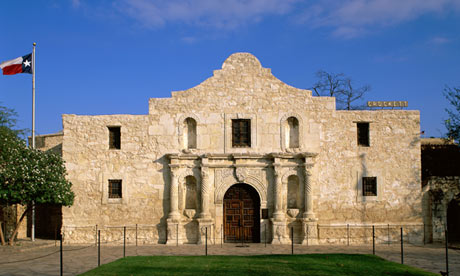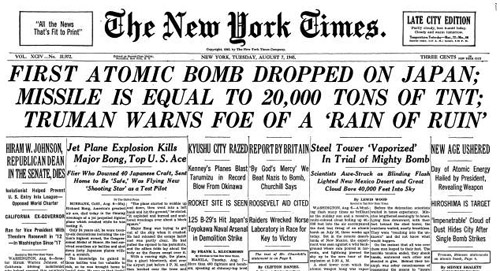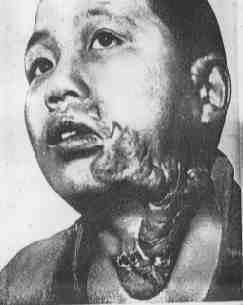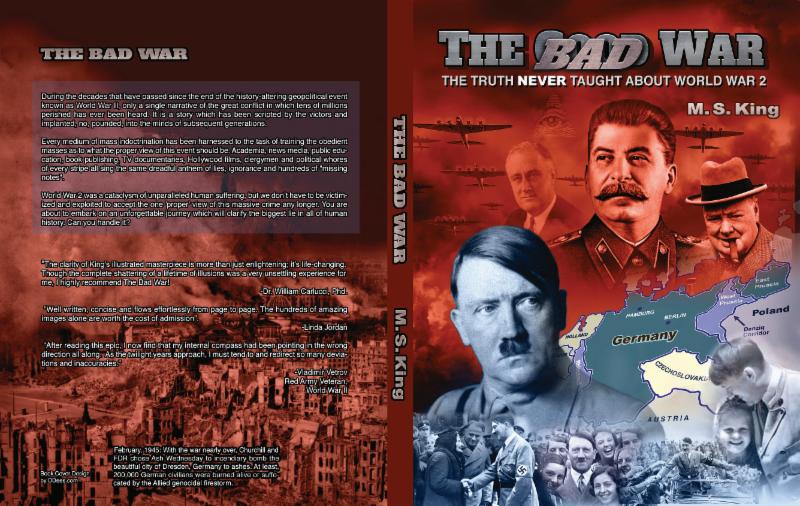Of all the stupid parroted cliches surrounding World War II, the "justification" for dropping Atomic Bombs on Japanese civilians has got to rank as one of the most annoying, most persistent, and most disgusting of them all. You know the routine: "We would have lost at least 100,000 men if we had to invade the mainland. The Atomic Bombs saved the lives of American soldiers."
It's time we lay this conscience-soothing falsehood to rest. Apart from the fact that it was FDR who set Asia ablaze in the first place by encouraging China to continue fighting Japan (which anyone who has read 'The Bad War' knows by now); and apart from the fact that FDR provoked and had foreknowledge of the justifiable Japanese attack on Pearl Harbor Naval Base (which anyone who has read 'The Bad War' knows by now); and apart from the fact that Japan in 1945 had been trying for months to negotiate an honorable surrender (which anyone who has read 'The Bad War' knows by now) - the argument (rationalization) for dropping not one, but two A-bombs in order to "save lives" is also morally invalid and extremely offensive, on its own - even if one hasn't read 'The Bad War'.
To illustrate both the moral and logical folly of the "bombing Hiroshima and Nagasaki saved American lives" line of reasoning, let us go back to 1836 and revisit "The Battle of the Alamo", with a twist.
The Battle of the Alamo (February 23 – March 6, 1836) was a pivotal event in the Texas Revolution. Following a 2-week siege, Mexican troops under President General Antonio López de Santa Anna launched
an assault on the Alamo Mission near San Antonio. The Texans were outnumbered and out-gunned. But, like the Japanese of 1945, they were tenacious fighters determined to stand their ground to the last man. Somewhere between 190-250 Texan defenders lost their lives at the Alamo; but they took 500-600 Mexicans to the grave with them.
Poor General Santa Anna. If only he had not been so constrained by the prevailing Christian ethic of the day. Had the relativistic moral standards of the 20th century been in place during the 1830's, his men could have been spared. What follows is an alternate scenario of The Battle of the Alamo. The year is 1836; and 'you are there'.


The Texans refused to surrender.
After assessing the situation and realizing that Messrs. Bowie, Travis and Crockett would rather die fighting than crawl on their knees, the wise and noble Santa Anna makes a moral calculation that will save the lives of many of his troops:
Santa Anna: Captain Gonzalez. Come here.
Captain Gonzalez: Si Senor!
Santa Anna: Take 100 of your men and go into town. Your men are to slit the throats of the first 1,000 people you see. Women, children, elderly - it doesn't matter. Then, set fire to the whole town.
Captain Gonzalez: Dios Mio!!! What are you saying Senor?! With all due respect, Senor Presidente; we are soldiers, not butchers!
Santa Anna: I understand your concern, Captain. But this is actually the right thing to do.
Captain Gonzalez: Yo no comprendo?
Santa Anna: It's elementary, stupido! When the Texans see that they are powerless to stop us from killing their families, they will surrender in order to stop the slaughter. The battle will be over and many Mexican lives will be saved. It's all perfectly moral.
Captain Gonzalez: Ahhhh. I see know. Genius! I never looked at it that way.
Santa Anna: That's why you are a Captain and I am El General, and Presidente too! Now, after your men have slit 1,000 throats, have them decapitate the bodies and affix the heads to long spears. We want those fanatics in the Alamo to see the high cost of their so-called "valor".
Captain Gonzalez: Si Senor! Con gusto!
*
The Mexicans go door-to-door carrying out the great moral order of Santa Anna. Blood curdling screams of women and children are heard all the way to the Alamo. The ferocious and fearless fighting men begin to quiver - wondering if their own wives, mothers, fathers, or children are among those that they can hear being massacred with such bestial cruelty. Rivers of blood flow through the streets. The screams are soon followed by an even more ominous silence as the flames of San Antonio burn in the distance. The bereaved Texans sleep hardly a wink that night.


"Please don't kill my Mommy! Please! Mommy! Mommy! Noooo!"
Mexican Soldier: "Silencio muchacha. You are next!"
The following morning, Mexican troops appear before the Alamo, brandishing the speared heads of their family members for all of the fighting Texans to see. A letter from Santa Anna, addressed to James Bowie, is delivered to the gate. It reads: "Surrender unconditionally or else we will slit the throats of 1000 more of your women and children."
Broken, dejected and demoralized, the men of the Alamo agree to surrender unconditionally. The Texans are then blamed for the war and the leaders of the resistance are "tried" and hanged as "war criminals". From that day forward, Santa Anna will be celebrated as the great leader who made a necessary and moral judgment call.


Santa Anna Truman threatens a "Rain of Ruin" unless the Alamo-Japanese surrender unconditionally.
*
Now, there is one little inconsistency with this fictitious analogy. You see, the women and children of San Antonio died a relatively quick and painless death. Once the jugular vein is slit, consciousness is soon lost when blood pours out as if from an open water hose. But with the majority of the victims of Hiroshima and Nagasaki, death due to severe burns, radiation poisoning and cancer came in the form of slow-motion torture lasting weeks, months, and even years. Those killed with the initial blasts were the lucky ones.
In other words, the San Antonio massacre scenario would actually have been far more humane and "honorable" than what was done to Japan! The fact that the flying A-Bombers of Japan didn't have to look their terrified victims in the eye - unlike the throat-slashers of San Antonio who did their dirty work up close - makes no difference, at all. Yet, clearly, no one in their right mind would regard the hypothetical San Antonio massacre as justifiable. So, why were Hiroshima and Nagasaki "OK"?
Somewhere in warfare there should be some sense of honor, a Knight's Code. We believed that once. But that was long before the Old Testament gang took over U.S. foreign policy.
Anyone care to refute the logic of this analogy? I'm dying to hear it.



A quick and easy throat-cutting would be far more humane than this!

No hay comentarios:
Publicar un comentario